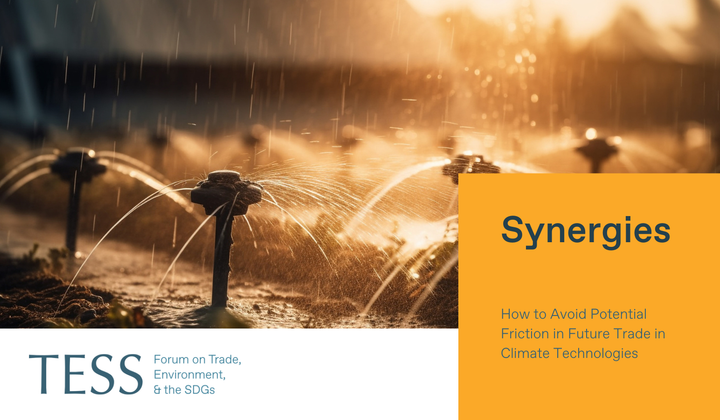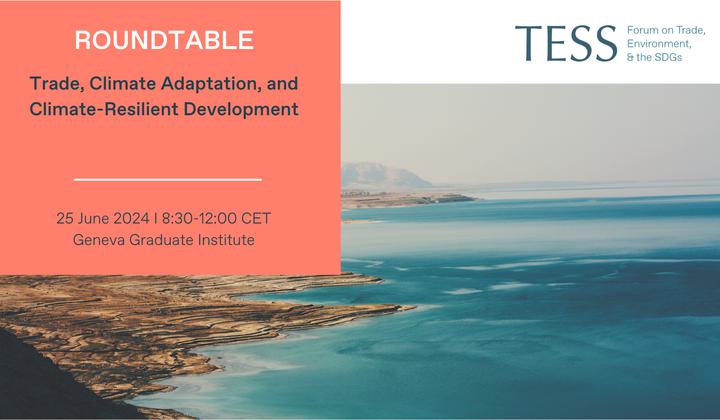On 25 June 2024, TESS convened a roundtable on trade, climate adaptation, and climate-resilient development. Bringing together Geneva-based trade and environment delegates with leading experts from think tanks, research centres, stakeholder organizations, and international organizations, the dialogue provided an opportunity to explore key trends and policy developments as well as challenges and opportunities for trade-related cooperation around trade, climate adaptation, and climate-resilient development.
The opening session of the roundtable was dedicated to setting the scene, with leading experts invited to discuss the trade and climate trends relevant to adaptation and climate-resilient development. In the open discussion that followed among delegations and experts, issues raised included the greatest trade-related climate risks and impacts, which sectors are most impacted, and the challenges and opportunities for developing and vulnerable economies. Participants further deliberated on the trade-related policy measures and initiatives that are and/or could be mobilized to support climate adaptation and address climate impacts and risks in the most vulnerable sectors, such as agriculture and food, health, water and sanitation, infrastructure, energy, and tourism. The role of technology transfer and Intellectual property rights were highlighted as key to unlocking a non-punitive trade and climate adaptation agenda.
The second session was dedicated to exploring avenues for enhanced inclusive international cooperation as well as priorities for cooperation on trade-related strategies, policies, measures, and assistance to support the climate-related priorities of developing and vulnerable countries.
In his remarks, Jimmy Rantes, Director General, Ministry of Trade and Commerce of Vanuatu, noted that trade can play a significant role in helping countries, especially those vulnerable to climate change, build resilience and adapt to the changing climate. He added that as a vulnerable country, Vanuatu needs support through shared knowledge and experience, financial support and investment, building resilient supply chains, and promoting sustainable development goals.
Regarding shared knowledge and experience, he emphasized the critical role traditional knowledge plays in building resilience for the development of small island nations such as Vanuatu. On financial support and investment, he underlined that it was fair for developed countries to increase their support for small island developing states (SIDS), small, vulnerable economies (SVEs), and least developed countries (LDCs), notably under the concept of loss and damage and the polluter pays principle. On resilient value chains, he stressed the importance of South-South cooperation efforts and the current development of a regional sustainable trade strategy among the 13 Pacific Island Countries (PICs). This latter strategy includes, among other priorities, full use of multilateral fora and negotiations to promote sustainable trade and aid for trade supporting the just transition.
H.E. Ambassador Ali Sarfraz Hussein, Permanent Representative of Pakistan to the WTO, noted that the key priorities for developing countries were access to increased funding for climate action initiatives, access to advanced technologies and knowledge to support the development and implementation of sustainable practices, streamlined financial support mechanisms such as simplified application processes and faster project approvals for the Green Climate Fund, and stronger partnerships between the WTO, World Bank, and IMF to help developing countries address climate change.
He further noted that trade policies can support climate resilience by prioritizing vulnerable sectors like agriculture through sustainable practices and technologies, investing in the manufacturing of green technologies and products, including as part of global value chains, and incorporating in trade agreements clauses on cooperation in the areas of climate adaptation and mitigation, capacity building and technical assistance, and intellectual property sharing for joint development of environmental solutions. He concluded by highlighting that enhanced international cooperation is crucial to ensure a fair and just transition to a carbon-neutral global economy.
H.E. Ambassador Salomon Eheth, Permanent Representative of Cameroon to the United Nations Office and other international organizations in Geneva, expressed concern about the current trend towards the generalization of unilateral measures, such as carbon border adjustments or deforestation regulations, which could further complicate the trade and development policies of many developing countries, including those like Cameroon primarily reliant on primary sector exports. He also noted that the issue of forest conservation and the promotion of economic development should be at the heart of multilateral discussions and ongoing cooperation and/or partnership initiatives addressing climate adaptation.
Looking ahead, Ambassador Eheth expressed the need to avoid imposing unilateral environmental measures linked to trade, encourage increased transparency of environmental measures linked to international trade based on the principles of equity and inclusion, and promote a coherent and open approach in the conduct of multilateral discussions based on consensus in the examination of issues related to trade, climate change, and development.




